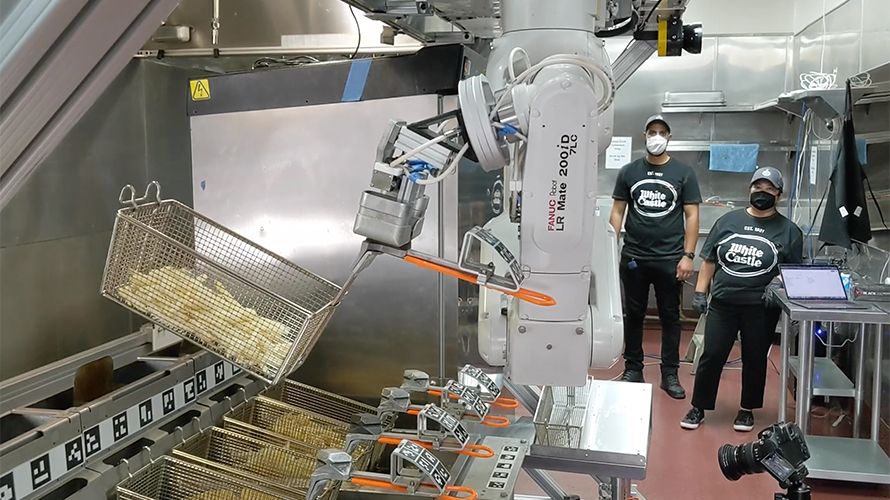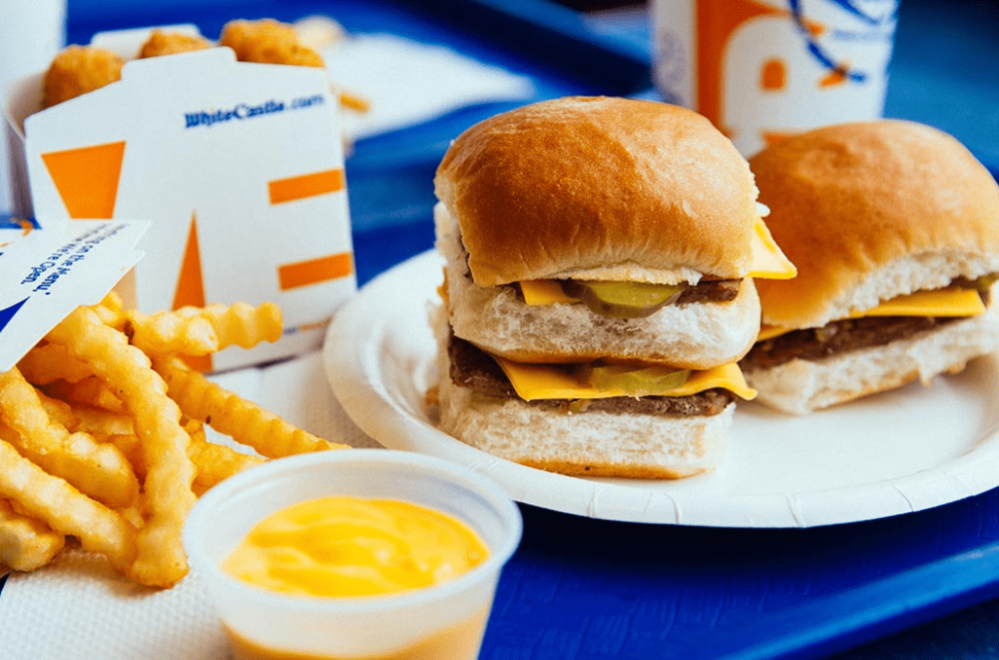If you eat at White Castle in the next few months, there’s a chance that a robot named Flippy will be cooking your burger.
The burger chain has been working with Pasadena, California-based startup Miso Robotics to figure out how innovation may be able to enhance its back-of-house operations. Through AI and automation, Flippy ROAR — which stands for robot-on-a-rail — helps grill and fry food with more precision than the human eye can achieve.
After a trial in one of White Castle’s Chicago outlets, Flippy is set to don the apron at up to 10 additional locations in the coming months.
“We started conversations with Miso about two years ago and we were intrigued by the idea of this being able to free up our team members to focus more on customer service and anticipation. There’s so much behind the counter in our restaurants that’s about anticipation,” Jamie Richardson, vice president of marketing and public relations at White Castle, tells AFN.
Although the fast food chain considered other potential partners for its foray into robotics, Miso seemed to best understand the its culture and goals.
“We were looking to create a better work environment for existing team members – not replace them,” Richardson says.
Flippy glides above workstations suspended from a rail, which keeps it from taking up too much space. It identifies both the type of food that it is cooking and the temperature, making sure everything is grilled or fried to perfection while monitoring the time remaining to cook everything consistently.
Since its first trial, the robot has prepared over 14,500 pounds of food across 9,720 individual meals. White Castle has been tracking Flippy’s performance record and so far it’s doling out 360 baskets of fried food each day.
“It takes an area of the operation that can be really hectic and high pressure and takes some of that pressure off the team members so they can do other things,” Richardson says.
This isn’t Flippy’s first gig. The robot has also worked at CaliBurger and at Dodger Stadium in Los Angeles, making chicken tenders.
Simple problems are the most appealing
When it comes to innovation, White Castle is finding promise in tackling some of the simpler problems that it encounters in its restaurants. In 2017, it partnered with Coca-Cola to replace its old soda machines with the beverage giant’s Freestyle drinks customizer, which allows customers to tailor their drinks to taste.
The company has also adopted a team member app that it created in-house which, as Richardson puts it, may not sound superbly glamorous but has packed a real punch in organizational terms.
Today, 95% of White Castle’s team members use the platform to swap shifts, take time off, or find someone cover them without having to track down a general manager for approval. They can also pick up extra shifts at nearby store locations and receive important reminders and updates about things like food safety.
“We’ve taken that out of the old command and control environment that the world is used to when it comes to scheduling,” Richardson said.
“Managers no longer have to solve the Rubik’s cube of who can work Wednesday night at 7 pm anymore. And they still have a line of sight to see what’s happening.”
On the alt-protein front, too, White Castle has blazed a trail. In April 2018 it became the first mainstream, fast-food burger chain in the US to add Impossible Foods’ plant-based patty to its menu in the form of the Impossible Slider.
In February this year, it went a step further – giving its customers the option of swapping out the American cheese slice in their sliders in favor of a dairy-free alternative.
Covid-19 is expediting tech adoption
In response to Covid-19, White Castle made a decision to avoid layoffs at all costs. Several employees took pay cuts — including the CEO — and the company offered free meals to front-line workers like emergency medical technicians and other healthcare workers.
But the pandemic hasn’t stopped White Castle’s intentions around technology.

In September, the chain proceeded with rolling out a new loyalty program to mark its 100th birthday, despite the Covid-19 crunch. To participate, customers have to download the its app, which keeps track of their purchases and awards points as they order. The interactive platform lets customers fill out surveys that the brand can use to shape new product development.
The pandemic has driven many restaurants to embrace tech solutions on an expedited timeline in order to reach customers through shelter-in-place restrictions and shuttered dining rooms.
Reflecting this, there has been a steady flow of investment deals into restaurant and in-store retail tech startups during 2020. The freshly funded technologies offer everything from food pick-up cubbies to cloud kitchen tools and reservation services.
“Technology is here to stay, and it doesn’t have to be scary that the pace quickens. It’s a source of joyful exuberance – not something to be paranoid about,” Richardson said.
“At the end of the day, we can create tools that help our team members get more fulfillment from the work they do. That’s a good thing.”





